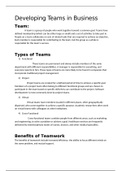Presentation
Presentation Unit 19 - Business events (T/502/5450) BTEC National Business, ISBN: 9780435462352
- Institution
- Pearson (PEARSON)
It is assignment of unit 19 btec extended diploma business . Assignment is on developing team in business . It contains answers to following questions 1) First describe different types of team and the benefits of teams for an organization. (This will fulfil the requirement for P1. Then compare...
[Show more]



